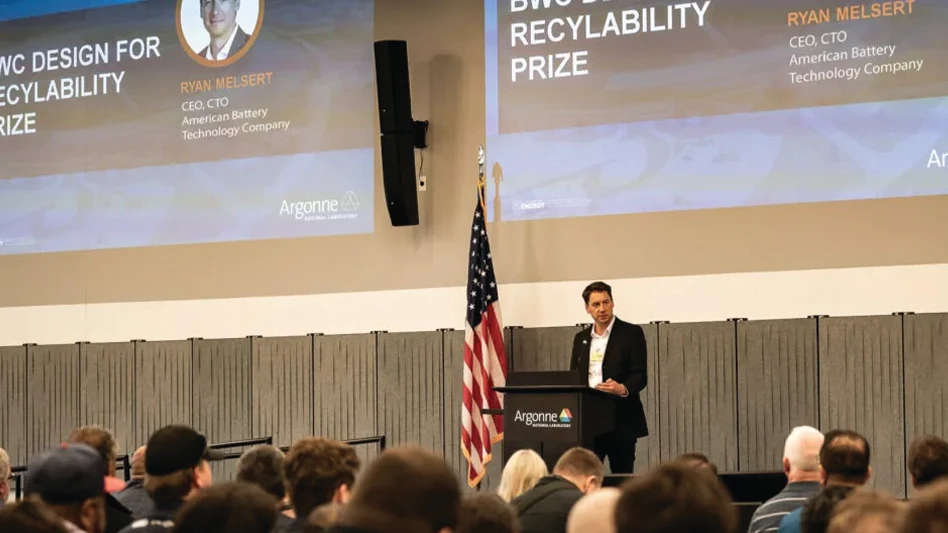
Photo courtesy of American Battery Technology Co.
Battery refiner and recycler American Battery Technology Co. (ABTC), Reno, Nevada, has entered the U.S. Department of Energy’s (DOE’s) Battery Workforce Challenge, and has announced the launch of a new “Design for Recyclability” category for the three-year collegiate and vocational engineering competition.
According to ABTC, the competition supports 12 North American teams of universities and their regional vocational partners that are each designing, building, testing and integrating a next-generation advanced lithium-ion battery pack and electric powertrain into a Stellantis-donated 2024 Ram ProMaster electric vehicle (EV).
RELATED: ABTC appoints new chief operating officer | ABTC enters black mass purchase agreement with domestic customer
The company’s entrance into this competition brings an additional dimension of performance in the evaluation of these designs, it says, as students now are challenged to design battery packs with recyclability in mind, allowing for the batteries to be strategically disassembled and recycled at the end of their lives. The components within the batteries then are able to be recovered and resold into the domestic North American supply chain to create a closed-loop circular infrastructure, increasing the residual value of the battery pack and lowering overall life cycle costs of EVs.
“We work directly with many of the premier automotive OEMs [original equipment manufacturers] and receive large amounts of current and next generation prototype battery packs, and these pack designs are becoming increasingly complex with the proliferation of cell-to-pack, advanced passive propagation resistance, and hybrid cell chemistry designs,” ABTC CEO Ryan Melsert says.
“When we speak with leadership at these automotive OEMs, they often detail the engineering methods to increase gravimetric and volumetric energy density to increase performance and lower overall cost,” Melsert adds. “However, one of the most impactful tools for decreasing cost is to increase the residual value of the battery at its end-of-life, and embedding from the early design stages a strategic plan for how to demanufacture a battery can significantly lower recycling costs and increase recovery rates within a recycling process.”
ABTC says the training and guidance it will provide through the program will help steer new battery pack designs toward more environmentally and economically sustainable materials and practices.
The Battery Workforce Challenge is sponsored by the DOE and automaker Stellantis and managed by the Argonne National Laboratory. It provides future engineers and technicians real-life experiences to shape new energy-efficient mobility solutions. ABTC says the new “Design for Recyclability” category focuses on areas such as three-dimensional modeling, dynamic simulations and life cycle modeling and economic impact, and it introduces students to Argonne National Laboratory ReCell’s BatPaC, Greet and EverBatt models for calculating life cycle greenhouse gas emissions, economic impacts and ensuring end-of-life materials are reintroduced into the domestic supply chain.
ABTC says it also will support other initiatives within the program, including efforts to establish regional workforce training hubs nationwide that will step into critical skill gaps and identify areas to reskill and upskill vocational and transitional workers for in-demand EV and battery manufacturing and recycling jobs.
Get curated news on YOUR industry.
Enter your email to receive our newsletters.Latest from Recycling Today
- ICM to host co-located events in Shanghai
- Astera runs into NIMBY concerns in Colorado
- ReMA opposes European efforts seeking export restrictions for recyclables
- Fresh Perspective: Raj Bagaria
- Saica announces plans for second US site
- Update: Novelis produces first aluminum coil made fully from recycled end-of-life automotive scrap
- Aimplas doubles online course offerings
- Radius to be acquired by Toyota subsidiary






